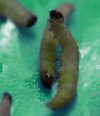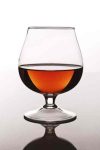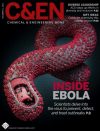ACS News Service Weekly PressPac: December 03, 2014
ACS News Service Weekly PressPac: December 03, 2014
- General Inquiries: Michael Bernstein, 202-872-6042
- Science Inquiries: Katie Cottingham, Ph.D., 301-775-8455
News Items in This Edition
Gut bacteria from a worm can degrade plastic
Plastic is well-known for sticking around in the environment for years without breaking down, contributing significantly to litter and landfills. But scientists have now discovered that bacteria from the guts of a worm known to munch on food...
Novel approach to treating asthma: Neutralize the trigger
Current asthma treatments can alleviate wheezing, coughing and other symptoms felt by millions of Americans every year, but they don’t get to the root cause of the condition. Now, for the first time, scientists are reporting...
Toward a low-cost ‘artificial leaf’ that produces clean hydrogen fuel
For years, scientists have been pursuing “artificial leaf” technology, a green approach to making hydrogen fuel that copies plants’ ability to convert sunlight into a form of energy they can use. Now, one team reports progress toward a stand-alone...
Electronic 'tongue' to ensure food quality
An electronic "tongue" could one day sample food and drinks as a quality check before they hit store shelves. Or it could someday monitor water for pollutants or test blood for signs of disease. With an eye toward these applications, scientists...
Deconstructing Ebola to find its weakness and defeat it
The Ebola epidemic in West Africa has pushed the decades-long search for a treatment to a frenetic pace. Somewhere in the virus’ deceptively simple structure is a key to taming it. To find that key, scientists are undertaking multiple strategies...
Journalists’ Resources
Ebola Resources for Reporters
Have questions about the science underlying the ongoing Ebola crisis? ACS has set up a resource page on Ebola containing a list of related scientific papers, as well as Chemical & Engineering News articles, that journalists can access for free. It also includes a list of experts who can speak about this topic to the press. Visit our resource page at www.acs.org/Ebola.
ACS Experts: Chemistry Sources for Reporters
On a deadline? Need a reliable explanation of a chemistry concept? Then you need an ACS Expert. We have a growing list of scientists who can comment about neuroscience, green chemistry, pharmaceutical science, policy issues and much more. Just contact us at newsroom@acs.org.
ACS Editors' Choice
Do you want to keep up with the frontiers of science? Check out our new Open Access service, ACS Editors’ Choice. The website features one top story every day, selected from ACS’ more than 40 peer-reviewed journals, to give the public free, direct access to some of the most relevant scientific research going on today.
ACS National Meeting News
Couldn't go to the ACS 248th National Meeting & Exposition in San Francisco? Then check out our resources for info you might have missed:
Press releases: www.eurekalert.org/acsmeet.php
Press conferences: www.ustream.tv/channel/acslive
Toolkits on Global Challenges/Research Funding
Journalists covering some of the great global challenges of the 21st century and federal funding of research and development (R&D) can find videos and scores of other resources in websites that the American Chemical Society has prepared on those topics.
ACS Press Release Archive
Visit our press release archive for news on a variety of chemistry-related topics.
ACS Videos
The American Chemical Society encourages news organizations, museums, educational organizations and other websites to embed links to these videos.
ACS Video of the Month
The Chemistry of Cats - by Reactions
Cats are seemingly the most popular thing on the Internet. Now we've got answers to some of the biggest kitty questions out there: Why does catnip make most cats go crazy? How does kitty litter clump? And what does it mean when your cat rubs against your leg? It all comes down to some key "meow-lecules.". Check out the video to find out more.
Check out more Reactions videos and subscribe to the series at http://youtube.com/ACSReactions and follow Reactions on Twitter @ACSReactions.
C&EN Video Spotlight
What you need to know about microbeads
Your toothpaste and face scrub probably get their scrubbing power from tiny plastic beads. C&EN talks about these “microbeads” and why environmental scientists and dentists alike are nervous about them getting into lakes and rivers — and your gums. Find out more by watching the video.
Related Links
ACS Podcasts
Science Elements
Science Elements is a podcast that makes cutting-edge scientific discoveries from ACS journals available to a broader public audience. Listen to the podcasts at www.acs.org/ScienceElements.
This is the latest American Chemical Society (ACS) Office of Public Affairs Weekly PressPac with news from ACS’ more than 40 peer-reviewed journals and Chemical & Engineering News.
This information is intended for your personal use in news gathering and reporting and should not be distributed to others. Anyone using advance ACS Office of Public Affairs Weekly PressPac information for stocks or securities dealing may be guilty of insider trading under the federal Securities Exchange Act of 1934.
Please cite the individual journal, or the American Chemical Society, as the source of this information.
The American Chemical Society is a non-profit organization chartered by the U.S. Congress. With more than 161,000 members, ACS is the world’s largest scientific society and a global leader in providing access to chemistry-related research through its multiple databases, peer-reviewed journals and scientific conferences. Its main offices are in Washington, D.C., and Columbus, Ohio.








